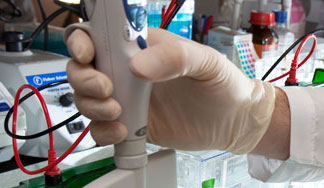
Montefiore Einstein Department of Medicine
Department Faculty
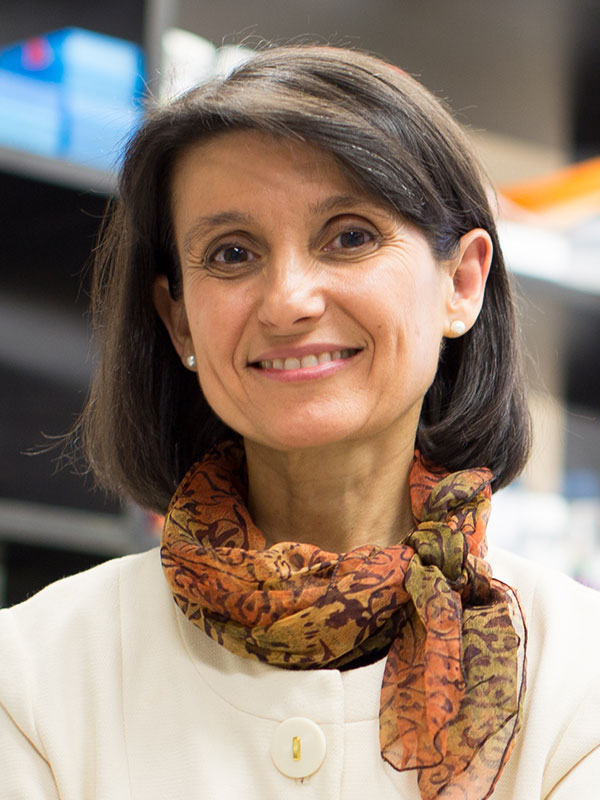
Ana Maria Cuervo, M.D., Ph.D.
Professor, Department of Developmental & Molecular Biology
Professor, Department of Medicine (Hepatology)
Robert and Ren�e Belfer Chair for the Study of Neurodegenerative Diseases
Professional Interests
Dr. Cuervo is co-director of the Einstein Institute for Aging Research, and a member of the Einstein Liver Research Center and Cancer Center. In 2001 she started her laboratory at Einstein, where she studies the role of protein-degradation in aging and age-related disorders, with emphasis in neurodegeneration and metabolic disorders.
Dr. Cuervo’s group is interested in understanding how altered proteins can be eliminated from the cells and their components recycled. Her group has linked alterations in lysosomal protein degradation (autophagy) with different neurodegenerative diseases including Parkinson’s, Alzheimer’s and Huntington’s disease. They have also proven that restoration of normal lysosomal function prevents accumulation of damaged proteins with age, demonstrating this way that removal of these toxic products is possible. Her lab has also pionered studies demonstrating a tight link between autophagy and cellular metabolism. They described how autophagy coordinates glucose and lipid metabolism and how failure of different autophagic pathways with age contribute to important metabolic disorders such as diabetes or obesity.
Dr. Cuervo is considered a leader in the field of protein degradation in relation to biology of aging and has been invited to present her work in numerous national and international institutions, including name lectures as the Robert R. Konh Memorial Lecture, the NIH Director’s, the Roy Walford, the Feodor Lynen, the Margaret Pittman, the IUBMB Award, the David H. Murdoxk, the Gerry Aurbach, the SEBBM L’Oreal-UNESCO for Women in Science, the C. Ronald Kahn Distinguished Lecture and the Harvey Society Lecture. She has organized and chaired international conferences on protein degradation and on aging, belongs to the editorial board of scientific journals in this topic, and is currently co-editor-in-chief of Aging Cell.
Dr. Cuervo has served in NIH advisory panels, special emphasis panels, and study sections, the NIA Scientific Council and the NIH Council of Councils and has been recently elected member of the NIA Board of Scientific Counselors and member of the of the Advisory Committee to the NIH Deputy Director.. She has received numerous awards for the pioneerign work of her team such as the 2005 P. Benson Award in Cell Biology, the 2005/8 Keith Porter Fellow in Cell Biology, the 2006 Nathan Shock Memorial Lecture Award, the 2008 Vincent Cristofalo Rising Start in Aging Award, the 2010 Bennett J. Cohen Award in Aging Biology, the 2012 Marshall S. Horwitz, MD Faculty Prize for Research Excellence and the 2015 Saul Korey Prize in Translational Medicine Science. She has also received twice the LaDonne Schulman Teaching Award. In 2015 she was elected International Academic of the Royal Academy of Medicine of the Valencia Community and in 2017, she was elected member of the Real Academia de Ciencias Exactas, Fisicas y Naturales. She was elected member of the American Academy of Arts and Sciences in 2018 and member of the National Academy of Science in 2019.
Selected Publications
(selected from >2000 per review publications)
- Cuervo, A.M.*; Stephanis, L.; Freundberg, R.; Lansbury, P.; Sulzer, D. Impaired degradation of mutant alpha-synuclein by chaperone-mediated autophagy. Science305, 1292-1295, 2004
- Kaushik, S.; Massey, A.C.; Kiffin, R., Cuervo, A.M*. Role of lysosomal lipid microdomains in the regulation of chaperone-mediated autophagy. EMBO J. 25, 3921-33, 2006
- Zhang, C., Cuervo, AM*. Restoration of chaperone-mediated autophagy in aging improves cellular maintenance and organ function. Nat. Med. 14: 959-65, 2008
- Singh, R.; Kaushik, S.; Wang, Y.; Xiang, Y.; Novak, I; Komatsu, M.; Tanaka, K.; Cuervo, A.M*.; Czaja, M.J*. Autophagy regulates lipid metabolism. Nature 458:1131-5, 2009
- Martinez-Vicente M, Talloczy Z, Wong E, Tang G, Koga H, de Vries R, Kaushik S, Arias E, Harris S, Sulzer D, Cuervo AM* Cargo recognition failure is responsible for inefficient autophagy in Huntington’s Disease. Nat. Neurosci. 13:567-76, 2010
- Bandyopadhyay U, Shridar S, Kaushik S, Kiffin R, Cuervo AM*, Identification of regulators of chaperone-mediated autophagy. Mol Cell 39: 535-47, 2010.
- Koga H., Kaushik S., Macian F. Verkushka, V. Cuervo AM* A photoconvertible fluorescent reporter to track chaperone-mediated autophagy. Nat Comm 2: 386, 2011
- Kon, M, Koga, Hl, Kiffin, R., Chapochnick, J. Macian, F, Vartikovski L., Cuervo AM*. Chaperone-mediated autophagy is required for turmor growth. Science TM 3:109ra117, 2011
- Wong E, Bejarano E, Hanson HH, Zaarur N, Phillips GR, Sherman MY, Cuervo AM*. Molecular determinants of selective clearance of protein inclusions by autophagy. Nat Comm 3:1240, 2012
- Orenstein SJ, Kuo SH, Tasset-Cuevas I, Arias E, Koga H, Fernandez-Carasa I, Cortes, E., Honig, L.S., Dauer, W., Consiglio A, Raya A, Sulzer, D, Cuervo AM. Interplay of LRRK2 with chaperone-mediated autophagy. Nat. Neurosci. 16:394-406, 2013
- Anguiano J, Gaerner T, Daas B, Gavathiotis E, Cuervo AM. Chemical modulation of Chaperone-mediated autophagy by novel retinoic acid derivatives. Nat. Chem. Biol. 9:374-82, 2013
- Pampliega O, Orhon I, Patel B, Sridhar S, Diaz-Carretero A, Beau I, Codogno P, Satir B, Satir P, Cuervo AM Functional interaction between autophagy and ciliogenesis. Nature 502:194-200, 2013
- Bejarano, E, Yuste, A, Patel B, Stout, RJ, Spary, D Cuervo AM. Connexins modulate autophagosome biogenesis. Nat. Cell. Biol. 16:401-14, 2014
- Schneider JL, Suh Y, Cuervo AM*. Deficient chaperone-mediated autophagy in liver leads to metabolic disregulation. Cell Metab. 20:417-432, 2014
- Schneider S, Villarroya J, Diaz A, Patel B, Urbanska AM, Thi MM, Villarroya F, Santambrogio L, Cuervo AM*. Loss of hepatic chaperone-mediated autophagy accelerates proteostasis failure in aging. Aging Cell, 14:249-64, 2015
- Rui Y-N, Xu Z, Patel B, Chen Z, Chen D, Tito A, David G, Sun Y, Stimming ER, Bellen H, Cuervo AM*, Zhang S*. Huntingtin functions as a scaffold for selective macroautophagy. Nat. Cell. Biol. 17: 262-75, 2015
- Park C, Shu Y, Cuervo AM*.Regulated degradation of Chk1 by chaperone-mediated autophagy in response to DNA damage. Nat. Commun. 6:6823 doi: 10.1038/ncomms7823, 2015
- Kaushik, S. Cuervo AM*. Degradation of lipid droplet-associated proteins by chaperone-mediated autophagy facilitates lipolysis. Nat. Cell. Biol. 17: 759-70, 2015
- Arias E., Koga H, Diaz A, Mocholi E, Patel B, Cuervo AM*. Lysosomal mTORC2/PHLPP1/Akt regulate chaperone-mediated autophagy. Mol. Cell 59, 270-84, 2015
- Kaushik, S. Cuervo AM*. AMPK-dependent phosphorylation of lipid droplet protein PLIN2 triggers its degradation by CMA. Autophagy. 12(2):432-438, 2016
- Maus M, Cuk M, Patel B, Lian J, Qimet M, Kaufmann U, Yang J, Horvath R, Hornig-Do H-T, Chrzanowska-Lightowlers ZM, Moore KJ, Cuervo AM, Feske S. Store-Operated Ca2+ Entry Controls Induction of Lipolysis and the Transcriptional Reprogramming to Lipid Metabolism.Cell Metab 25: 698-712, 2017
- Beckerman P, Karchin JB, Park ASD , Dummer P, Soomro I, Boustany-Kari C, Pullen S Qiu C, Miner JH, Hu C-A, Rohacs T, Inoue K, Shuta I, Saleem M, Palmer M, Cuervo AM, Kopp J, Susztak K. Transgenic Expression of Human APOL1 Risk Variants in Podocytes Induces Kidney Disease in Mice. Nat Med 23: 429-438, 2017
- Gomes LR, Menck, CFM, Cuervo AM*, Chaperone-mediated autophagy prevents cellular transformation by regulating MYC proteasomal degradation. Autophagy 13: 928-940, 2017
- Caballero B, Wang Y, Diaz A, Tasset I, Juste YR, Mandelkow E-, Mandelkow E, Cuervo AM*. Interplay of pathogenic forms of human tau with different autophagic pathways. Aging Cell 17(1): doi: 10.2222/acel.12692, 2017 PMID: 29024336
- Gong Z, Tasset I, Diaz A, Anguiano J, Tas E, Cui L, Kuliawat R, Liu H, Kuhn B, Cuervo AM*, Muzumdar R. Humanin is an endogenous activators of chaperone-mediated autophagy. J Cell Biol 217:635-647, 2018 PMID:2918752
- Pajares M, Rojo AI, Arias E, Diaz-Carretero A, Cuervo AM, Cuadrado A. Transcription factor NFE2L2/NRF2 modulates chaperone-mediated autophagy through the regulation of LAMP2A. Autophagy doi: 10.1080/15548627.2018.1474992, 2018
- Bejarano E, Murray J, Wang X, Pampliega, O, Yin D, Patel B, Yuste A, Wolkoff A, Cuervo AM. Defective recruitment of motor proteins to autophagic compartments contributes to autophagic failure in aging. Aging Cell doi: 10.1111/acel.12777, 2018
- Hernandez I, Luna G, Rauch JN, Reis S, Giroux M, Karch CM, Boctor D, Sibih Y, Storm NJ, Diaz A, Kaushik S, Zekanowski C, Kang AA, Hinman G, Cerovac V, Guzman E, Zhou H, Haggarty SJ, Goate A, Fisher SK, Cuervo AM, Kosik KS Farnesyl Transferase Inhibition for the Treatment of Tauopathies. Science TM. 2019 Mar 27;11(485). pii: eaat3005. doi: 10.1126/scitranslmed. aat3005.
- Kirchner P, Bourdenx M, Madrigal-Matute J, Tiano S, Diaz A, Barholdy BA, Will B, Cuervo A. Proteome-wide analysis of chaperone-mediated autophagy targeting motifs. PLOs Biology, 17(5):e3000301. doi: 10.1371/journal.pbio.3000301, 2019
- Dong S, Aguirre-Hernandez C, Scrivo A, Eliscovich C, Arias E, Bravo-Cordero JJ, Cuervo AM. Monitoring spatiotemporal changes in chaperone-mediated autophagy in vivo. Nature Comm. 11(1):645. doi: 10.1038/s41467-019-14164-4, 2020
- Dong S, Wang Q, Kao YR, Diaz A, Tasset I, Kaushik S, Thiruthuvanathan V, Zintiridou A, Nieves E, Dzieciatkowska M, Reisz JA, Gavathiotis E, D’Alessandro A, Will B, Cuervo AM. Chaperone-mediated autophagy sustains hematopoietic stems cell function. Nature 591:117-123, 2021
- Caballero B, Bourdenx M, Luengo Martin E, Diaz A, Sohn PD, Chen X, Wang C, Juste YR, Wegman S, Patel B, Young ZT, Kuo SY, Rodriguez-Navarro JA, Shao H, Lopez MG, Karch CM, Goate A, Gestwicki JE, Hyman BT, Gan L, Cuervo AM. Inhibition of chaperone-mediated autophagy by acetylated tau promotes disease propagation. Nat. Comm. 12(1):2238 doi: 10.1038/s41467-021-22501-9, 2021
- Bourdenx M, Martin-Segura A, Scrivo A, Rodriguez-Navarro J, Kaushik S, Tasset I, Diaz A, Strom NJ, Xin Q, Juste YR, Stevenson E, Luengo E, Clement C, Choi SJ, Krogan NJ, Mosharov EV, Santambrogio L, Grueninger F, Collin L, Swaney DL, Sulzer D, Gavathiotis E, Cuervo AM. Chaperone-mediated autophagy prevents collapse of the neuronal metastable proteome. Cell 184: 1-19 doi: 10.1016/j.cell.2021.03.048, 2021
- Juste YR, Kaushik S, Bourdenx M, Aflakpui R, Bandyopadhyay S, Garcia F, Diaz A, Lindenau K, Tu Vincent, Krause GJ, Jafari M, Singh R, Muñoz J, Macian F, Cuervo AM. Reciprocal regulation of chaperone-mediated autophagy and the circadian clock. Nat. Cell Biol. 23(12):1255-1270 10.1038/s41556-021-00800-z. 2021, 2022
RECENT REVIEWS
- Kaushik S, Cuervo AM. Proteostasis and aging. Nat Med. 21:1406-15, 2015
- Tekirdag KA, Cuervo AM. Chaperone-mediated autophagy and endosomal microautophagy: joint by a chaperone. J. Biol. Chem. 293:5414-5424, 2018
- Kaushik K, Cuervo AM. The coming of age of Chaperone-mediated autophagy. Nat. Rev. Cell. Mol. Biol. Doi: doi.org/10.1038/s41580-018-0001-6, 2018
- Scrivo A, Bourdenx M, Pampliega O, Cuervo AM. Selective autophagy as a potential therapeutic target for neurodegenerative disorders. Lancet Neurol 17(9):802-815, 2018
- Arias E, Cuervo AM. Pros and cons of chaperone-mediated autophagy in cancer. Trends. Endocrinol Metab. S1043-2760(19)30208-5. doi: 10.1016/j.tem.2019.09.007, 2019
- Krause GJ, Cuervo AM. Assessment of mammalian endosomal microautophagy. Methods Cell Biol 164:167-185, 2021
- Kaushik S, Tasset I, Arias E, Pampliega O, Wong E, Martinez-Vicente M, Cuervo AM. Autophagy and the Hallmarks of Aging. Ageing Res Rev. doi: 10.1016/j.arr.2021.101468, 2021
Research Images



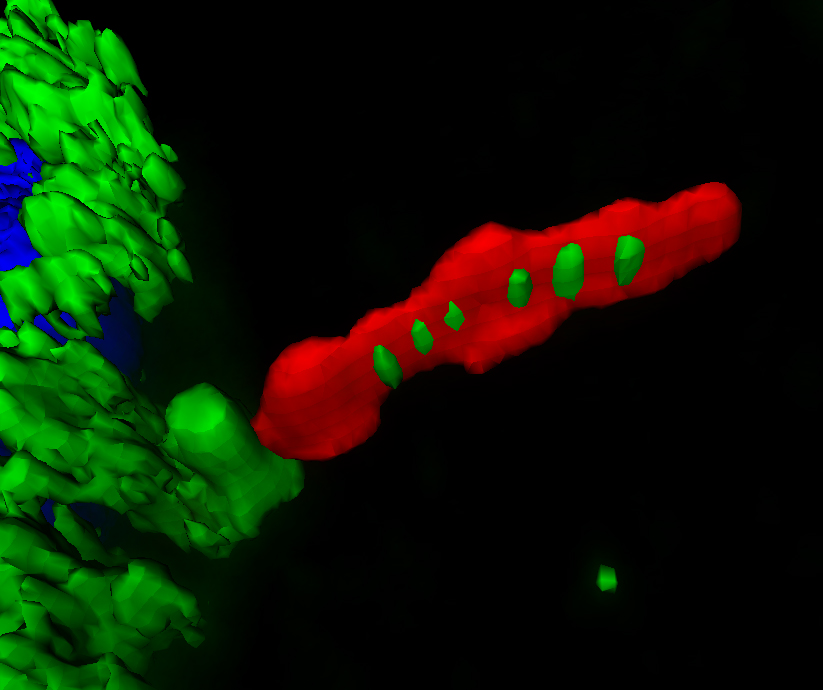
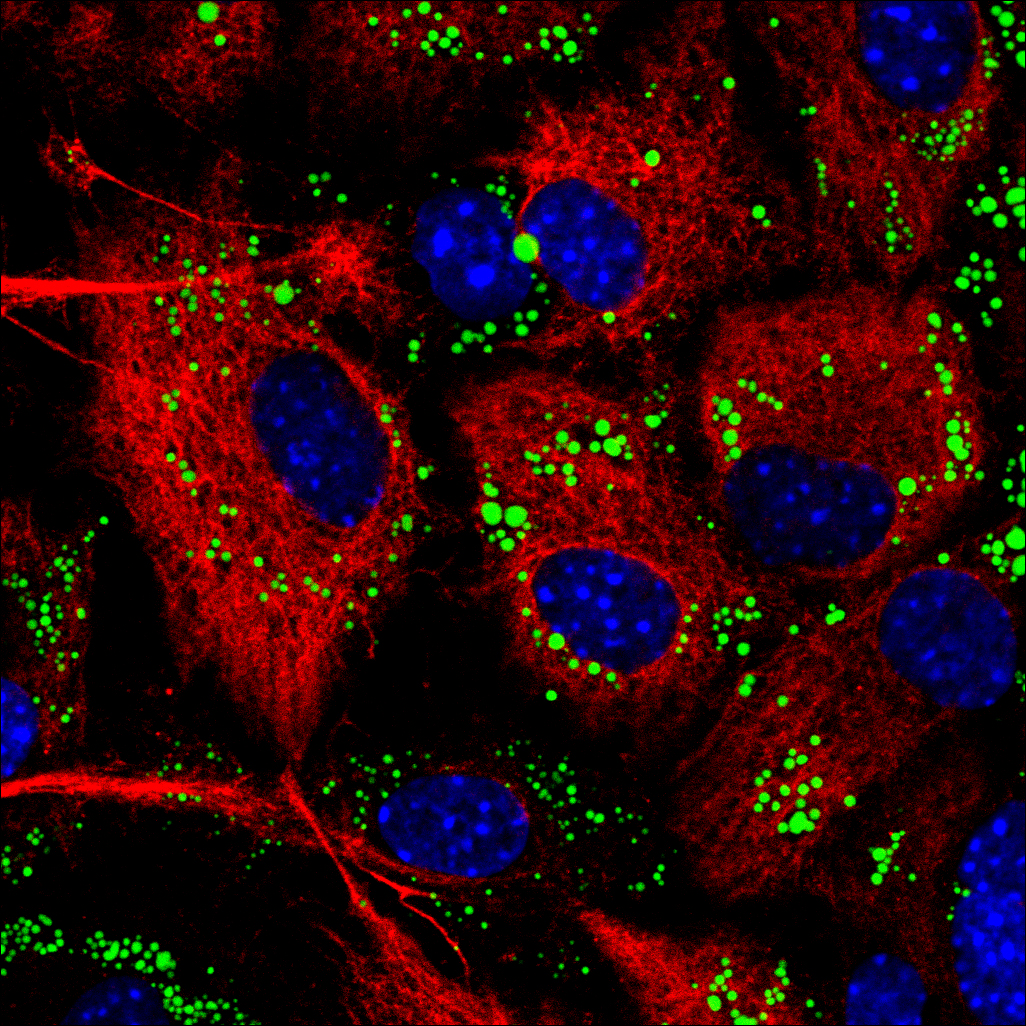
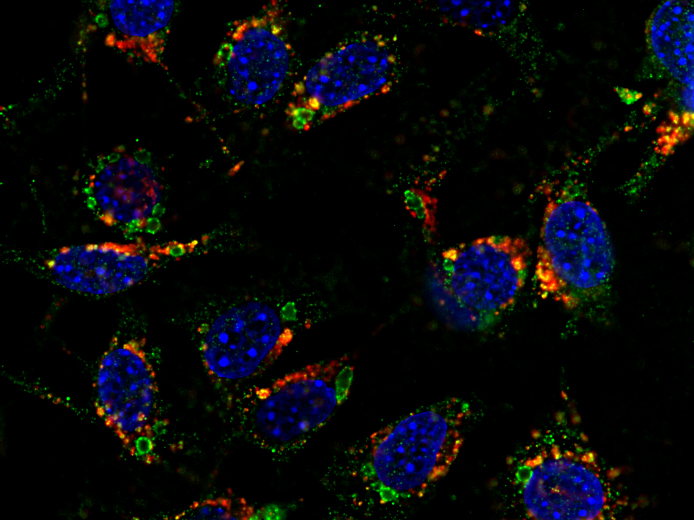
Click image to enlarge
More Information About Dr. Ana Maria Cuervo
Material in this section is provided by individual faculty members who are solely responsible for its accuracy and content.
Albert Einstein College of Medicine
Jack and Pearl Resnick Campus
1300 Morris Park Avenue
Chanin Building, Room 504
Bronx, NY 10461
Fax: 718.430.8975
ana-maria.cuervo@einsteinmed.edu
In the News
The Biological Clean-Ups That Could Combat Age-Related Disease
Ana Maria Cuervo, M.D., Ph.D., comments on a novel compound she developed with Evripidis Gavathiotis, Ph.D., that reduces Alzheimer's symptoms in mice. The results are promising, and a clinical trial should follow. Dr. Cuervo is professor of developmental and molecular biology, co-director of the Institute for Aging Research, and holds the Robert and Renée Belfer Chair for the Study of Neurodegenerative Diseases at Einstein. Dr. Gavathiotis is professor of biochemistry and of medicine.
Drug that Boosts Brain's Cleansing System Improved Symptoms in Alzheimer's Mouse Model
Ana Maria Cuervo, M.D., Ph.D. and Evripidis Gavathiotis, Ph.D., developed an experimental drug that reinvigorates a cellular cleaning mechanism and reversed key symptoms of Alzheimer's disease in mice. Dr. Cuervo is professor of developmental and molecular biology, co-director of the Institute for Aging Research, and holds the Robert and Renée Belfer Chair for the Study of Neurodegenerative Diseases at Einstein. Dr. Gavathiotis is professor of biochemistry and of medicine.



